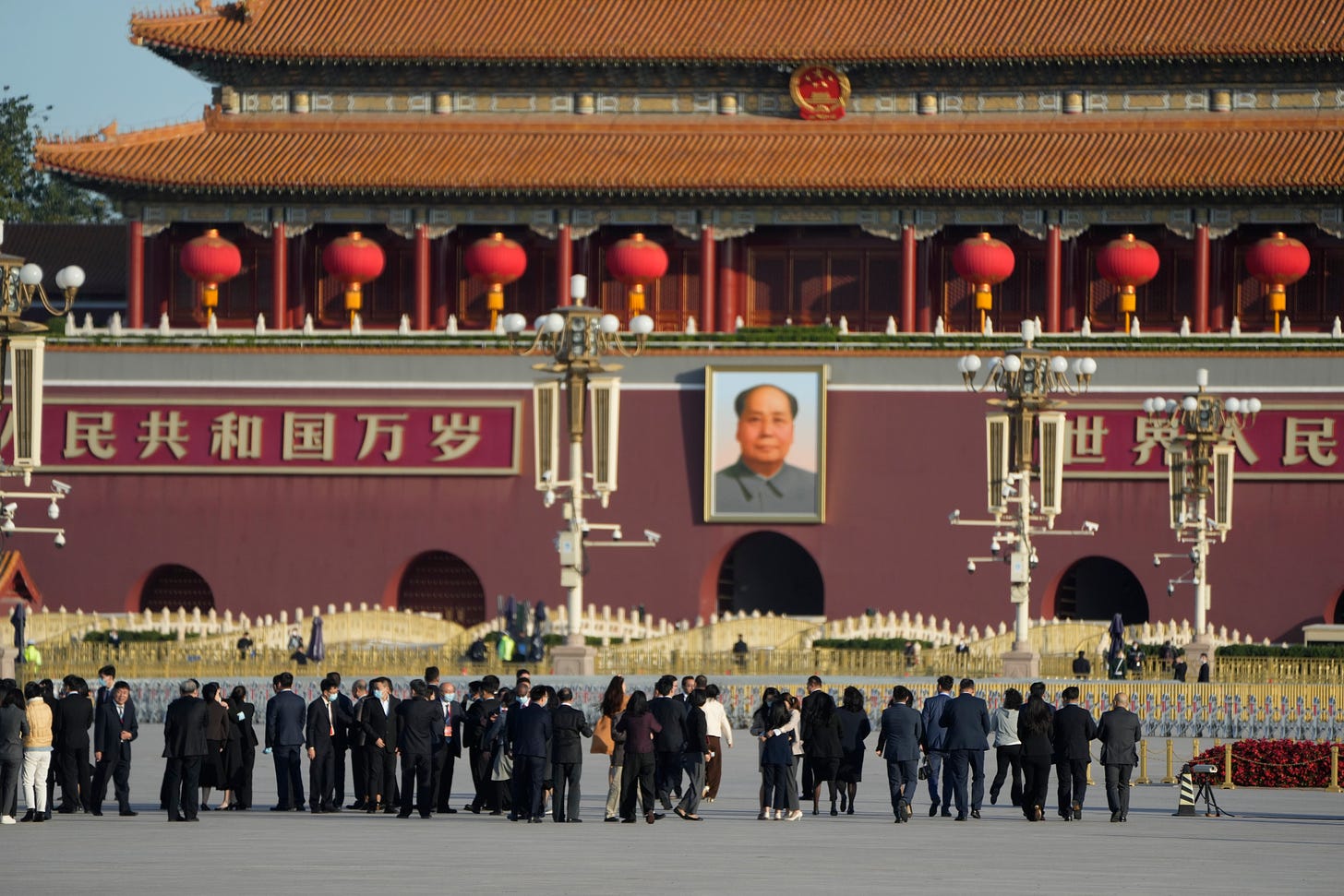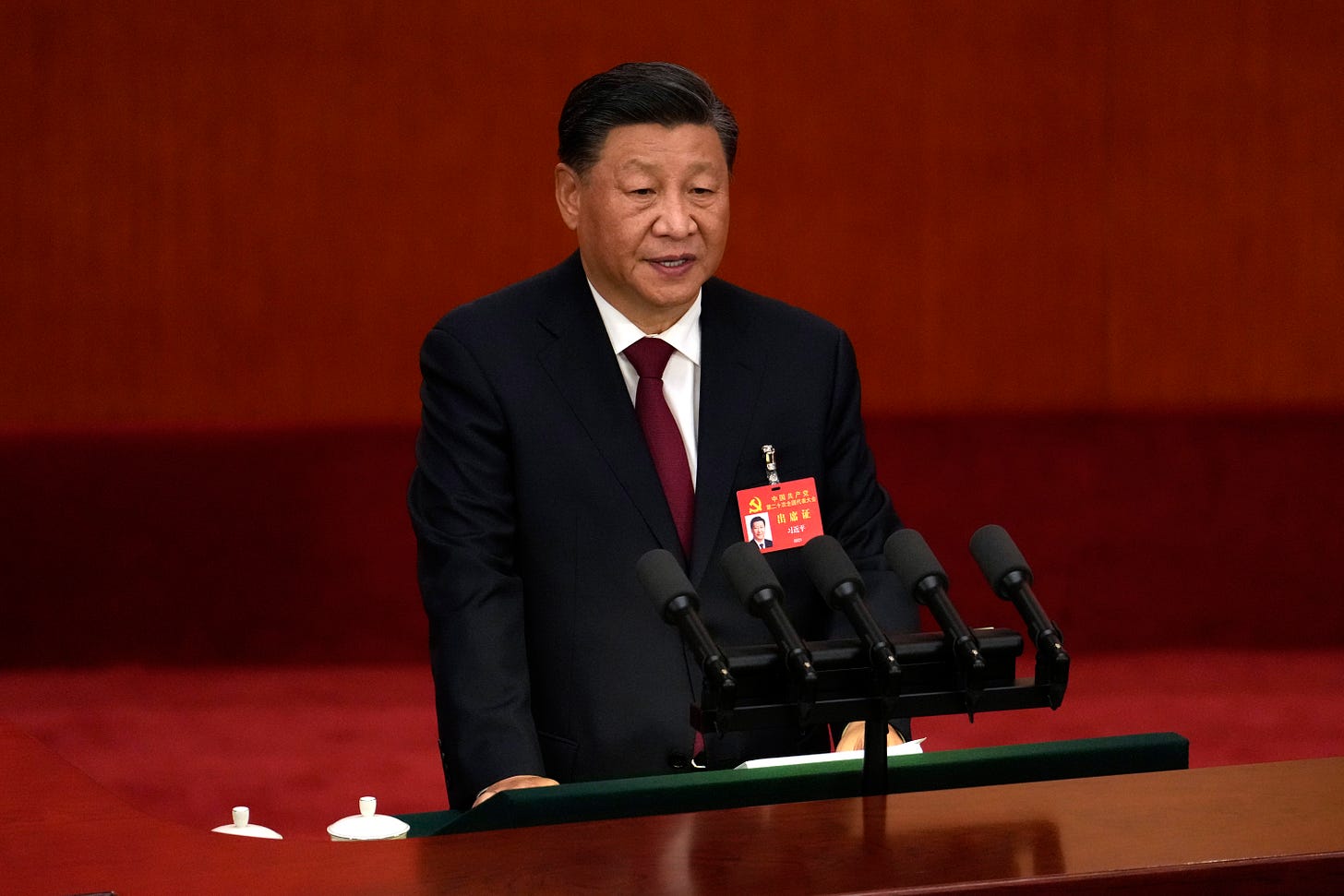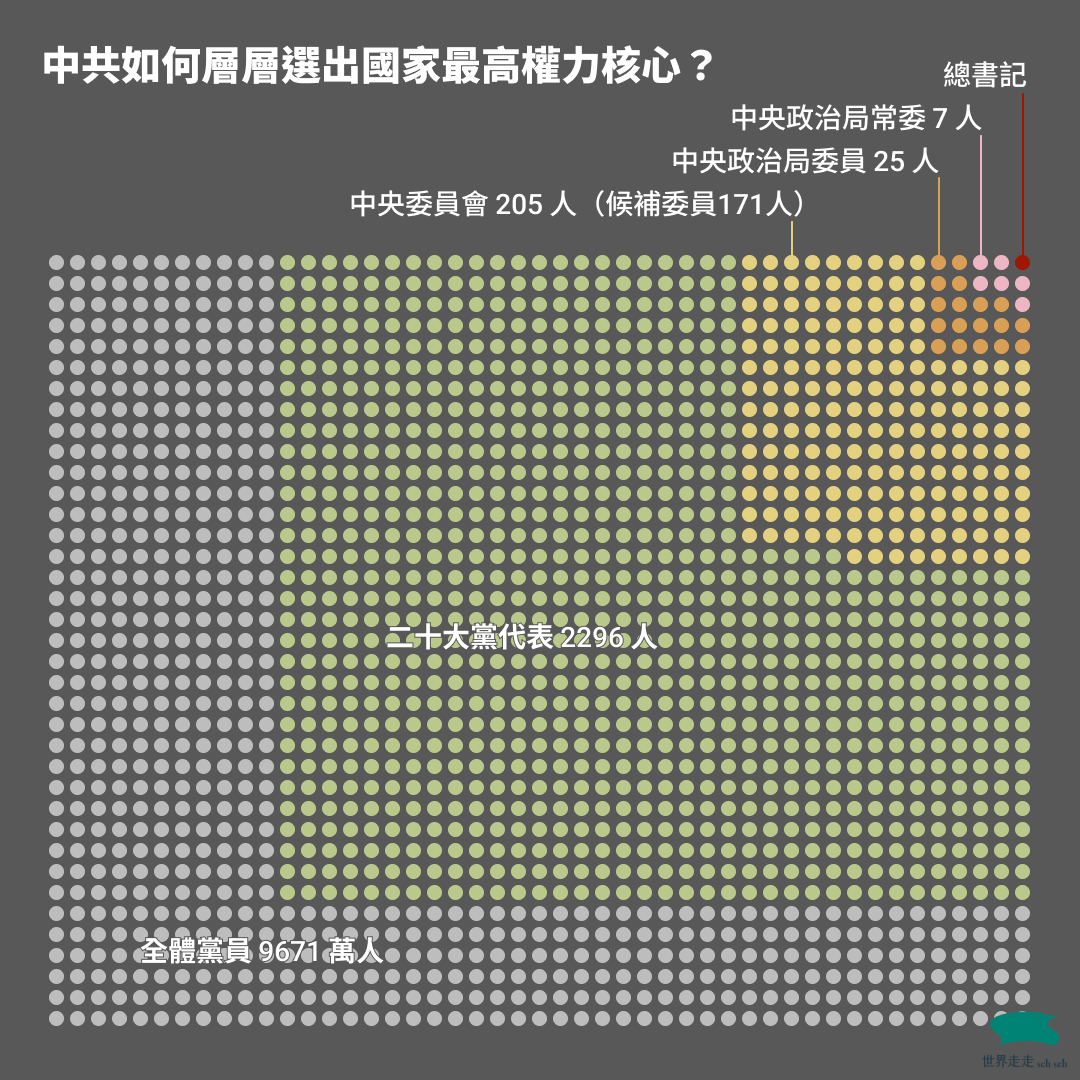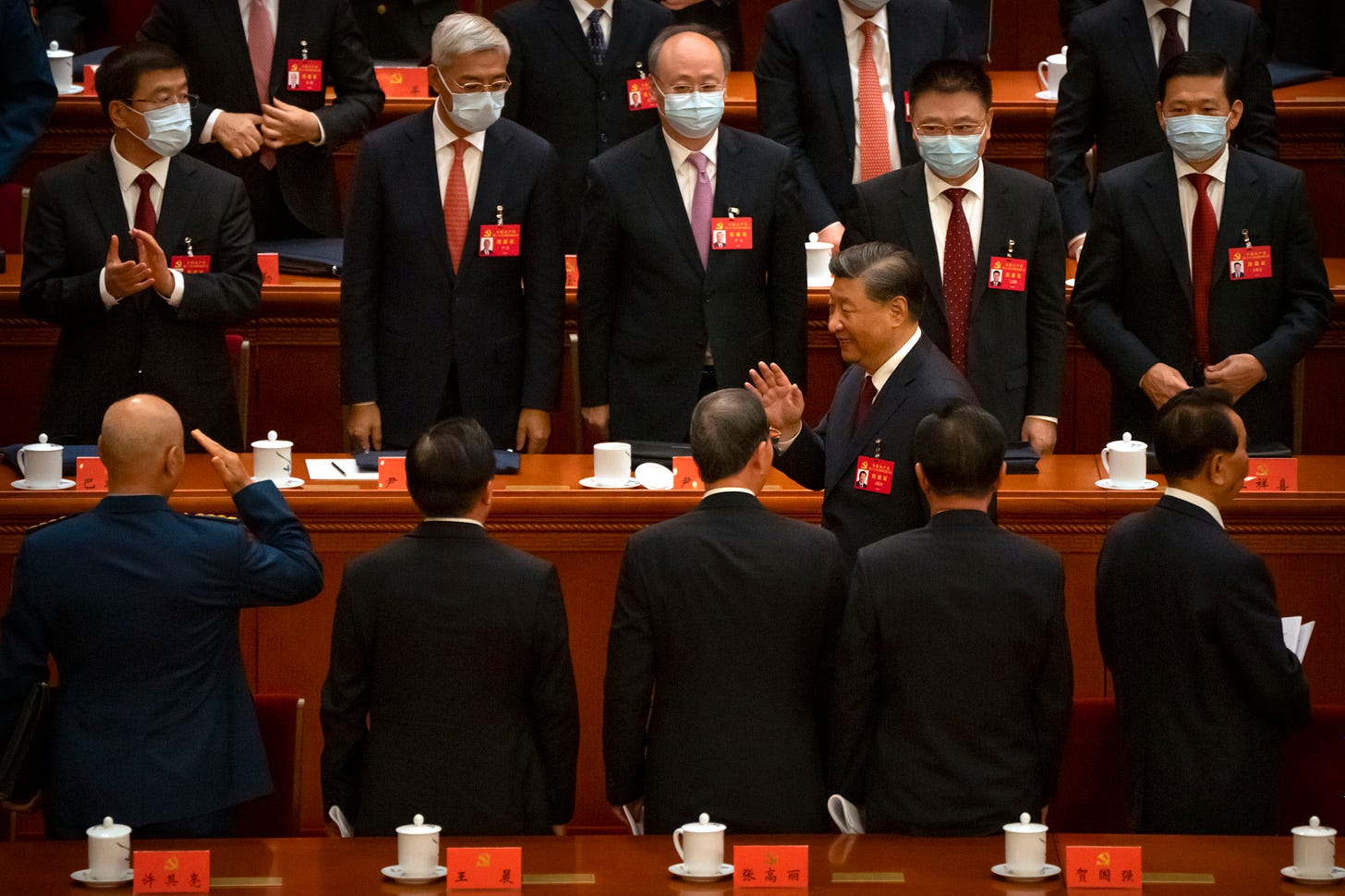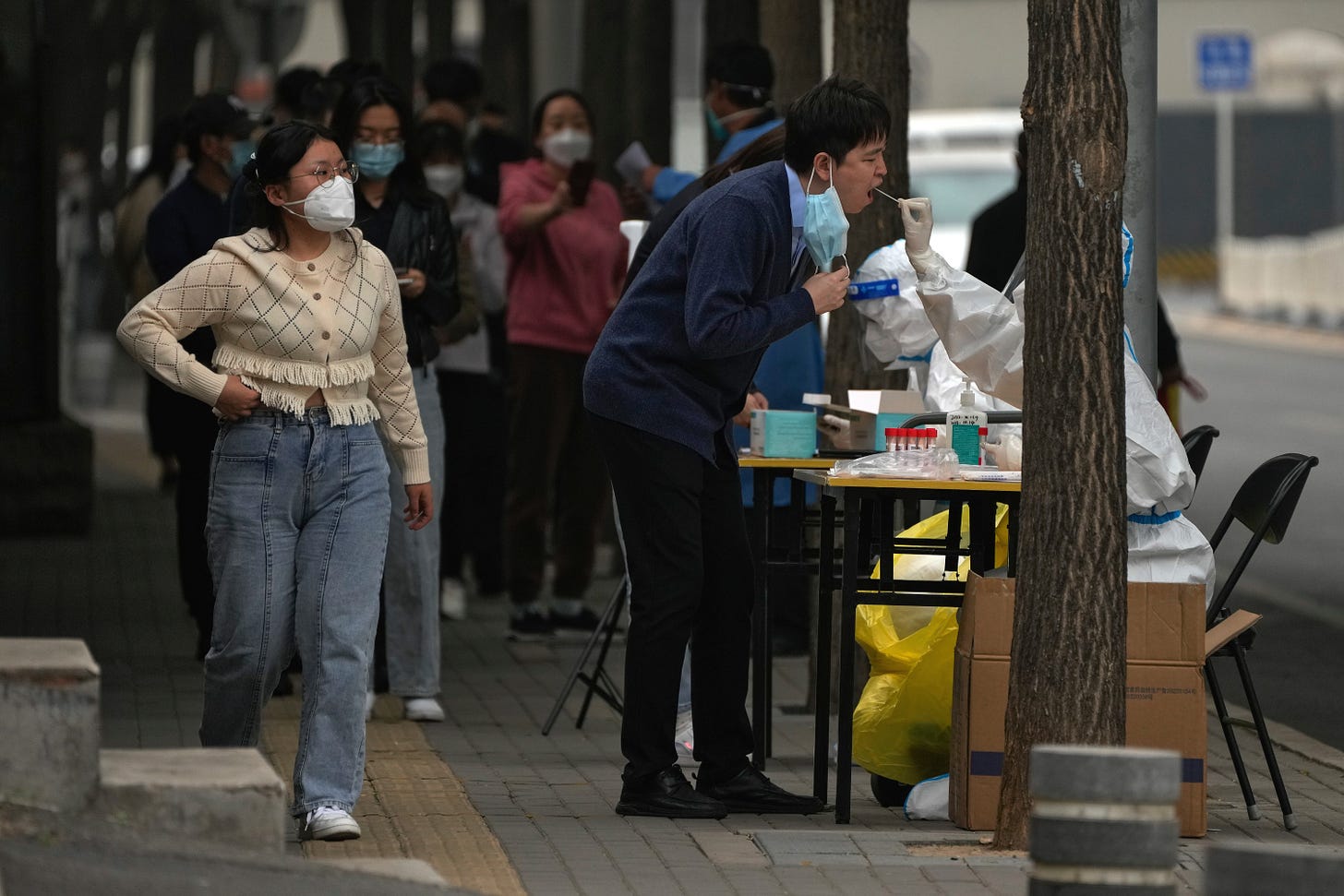Original link: https://sehseh.substack.com/p/e8c
?Official website good reading version|
text / walk
The 20th National Congress of the Communist Party of China debuted at the Great Hall of the People in Beijing on October 16, 2022.
After the 18th National Congress in 2012, Xi Jinping succeeded Hu Jintao as the top leader of the CCP. Since Xi Jinping has been in power for ten years, the relations between the two sides of the Taiwan Strait and the three regions and the geopolitics of the Asia-Pacific have undergone earth-shaking changes: the CCP has tightened internal freedom of speech, strengthened Internet censorship, and displayed a tough “wolf warrior diplomacy” externally; Hong Kong has experienced the Umbrella Movement and anti-revisionism For example, the relatively free political environment in the past has ushered in an unprecedented winter; Taiwan has grown from the “Ma-Xi meeting” to the recent atmosphere of “anti-China protection of Taiwan” by the officials and the people, and the tension between the two sides of the strait has already taken shape.
What will be confirmed after the 20th National Congress this time? In the next ten years after 2022, what will the future of the three places on the Taiwan Strait look like?
The following is a collection of QA questions and answers organized by the world. Regarding the 20th National Congress of the Communist Party of China, if you/do you want to know more about it, you are welcome to reply or leave a message to tell us.
-
“5”: What is the National Congress doing every five years? Why is the Big Twenty important?
-
“3”: Xi Jinping will break the convention for three consecutive terms? Why can he be re-elected like this?
-
“7”, “25”: Who are the core members who hold state power? How do they choose their successors?
-
“7 up and 8 down”: Who will step down and who will come to power? What is the practice of “seven up and eight down”?
-
“0”: Why are you still insisting on “clearing”? When will it end?
Q. What is the “National Congress” held every five years? Why is the Big Twenty important?
The full name of the 20th National Congress is “The Twentieth National Congress of the Communist Party of China”. The National Congress (“Party Congress”), held every five years, not only decides the direction of the government’s administration for the next five years, but also elects a new top leadership of the CCP.
In addition, at the 20th National Congress of the Communist Party of China, whether the current Chinese leader, Xi Jinping, will break the practice and be re-elected as the third general secretary is also the focus of global attention.
Since Jiang Zemin took over as state president in 1993, most of the top leaders of the CPC have concurrently served as “general secretary of the Central Committee”, “state president” and “chairman of the Central Military Commission”. After two terms, the leadership will be handed over to the new general secretary elected after the closing of the party congress. This was the case with previous CCP leaders such as Jiang Zemin and Hu Jintao.
But the outside world believes that Xi Jinping is very likely to break this convention and be re-elected for a third term.
On October 16, 2022, Xi Jinping delivered a speech at the opening of the 20th National Congress of the Communist Party of China. (AP)
Q. Xi Jinping will break the convention for three consecutive terms? Why can he be re-elected like this?
In March 2018, the Chinese People’s Congress passed the ” Amendment to the Constitution “, removing the provision that the chairman and vice-chairmen of the country cannot serve for more than two consecutive terms (ten years).
Before the amendment:
“The term of office of the President and Vice-Chairman of the People’s Republic of China is the same as that of the National People’s Congress, and the term of office shall not exceed two consecutive terms .”After the amendment:
“The term of office of the President and Vice-President of the People’s Republic of China is the same as that of the National People’s Congress.”
In addition, Xi’s party and military positions—general secretary of the CPC Central Committee and chairman of the Central Military Commission—have no term limits, two positions with real power. Therefore, the outside world believes that the revision of the constitution is to remove institutional obstacles for Xi Jinping, and it is predicted that he will be the top leader of the country after the 20th National Congress.
If Xi Jinping is reelected as general secretary for three consecutive times, it will break the practice of the CCP since the end of the Cultural Revolution. Therefore, the personnel arrangement of the new Politburo of the CPC Central Committee is not only related to whether the leadership can implement Xi Jinping’s will and decision-making, so that he can be regarded as the “Xi core”. The absolute authoritative position of Xi Jinping controls the power of the party and the government, and it can also be observed from the list whether Xi Jinping has the intention to promote his successor.
Q. Who are the core members who hold state power? How do they choose their successors?
The Political Bureau of the Central Committee, headed by the General Secretary, holds the highest power in the country and can determine the direction of China’s governance in the next five to ten years. From the operation of the Party Congress, we can see the political system of the CPC’s election from the bottom to the top.
According to statistics , as of the end of last year, the Communist Party of China had a total of 96.71 million members. Among them, female party members accounted for 29.4%, and minority party members accounted for 7.5%.
Political system of the CCP: More than 200 party members are elected by more than 2,000 party representatives to form the Central Committee (the number of each session is slightly different), and then 25 members of the Political Bureau of the Central Committee and 7 members of the Standing Committee are elected by the Central Committee. General Secretary. (Cartography: Lin Tingwei)
On September 25 this year, 2,296 party representatives were elected from various provinces and units in China. During the week-long national congress from October 16 to 22, this group of party representatives will listen to the previous work report, revise the party constitution, discuss major issues within the party, and elect members of the next central committee on the last day of the meeting. . At the “19th National Congress of the Communist Party of China” held in October 2017, 205 members of the Central Committee and 171 alternate members were elected, and the members and alternate members of the 20th session will be elected at the end of this meeting.
The newly elected Central Committee will convene the “First Plenary Session” (the first plenary meeting of the Central Committee) immediately after the Party Congress, that is, the 20th National Congress. During the five-year term of office, the Central Committee held a total of 7 Plenary Sessions; among them, the first Plenary Session is the most important, because the first Plenary Session will elect the future top leadership of the CCP: a total of 25 members of the Politburo of the Central Committee, and then elected from them There are 7 standing members, and the first standing member is the general secretary.
Q. Who will step down and who will take office? What is the practice of “seven up and eight down”?
When observing the personnel arrangements of the CCP leadership, age is an indicator worth paying attention to—the so-called “seven up and eight down” unwritten conventions were established during Jiang Zemin’s time, referring to the age of 67. Renewable, and retire at age 68. However, leaders themselves are not subject to this rule. Jiang Zemin was 71 years old when he was re-elected as general secretary of the 15th National Congress of the Communist Party of China.
For example, when the 19th National Congress of the Communist Party of China was held in 2017, Wang Qishan, who was 69 years old, stepped down as a member of the Standing Committee of the Political Bureau of the Central Committee, and Li Zhanshu, the eldest new member of the Standing Committee, was 67 years old.
However, in September 2022, the General Office of the CPC Central Committee promulgated the Regulations on Promoting the Ability of Leading Cadres to Go Up and Down. In the trial regulations in 2015, the clauses on retirement at the age of appointment and resignation at the end of the term were deleted, and those in power were also empowered to comply with the Can go up and down” The new framework breaks the space for employing people, and age is no longer a decisive factor in the layout of personnel.
According to the rules of seven ups and eight downs, there are three members of the current standing committee – Han Zheng, Li Zhanshu and Xi Jinping have exceeded the age limit, which means that two positions may be vacated on the standing committee. According to the BBC, the popular candidates who are expected to be “permanent” include Vice Premier Hu Chunhua, Li Qiang, Shanghai Party Secretary of the “Xi’s Army” who is close to Xi Jinping (the worry is that Shanghai’s poor epidemic prevention may affect his career), and Chongqing Municipal Party Secretary Chen Min’er . And Ding Xuexiang, who is also the secretary of the Secretariat of the Central Committee and the director of the general secretary’s office, is regarded as the core aide of Xi Jinping’s right and left.
It is worth noting that Premier Li Keqiang’s term will expire next year , and the 67-year-old may retire from politics after leaving office, or he may remain on the Standing Committee but hold other positions.
Although Li Keqiang’s power has been greatly weakened by Xi Jinping, who will become the next prime minister is also the focus of the reorganization of the leadership of the 20th Party Congress. Both are the prime minister’s successors favored by foreign media, and both of them and Li Keqiang belong to the “Tuanpai” faction that opposes Xi Jinping, which may represent the balance of power within the party.
On October 16, 2022, Xi Jinping greeted the representatives of the National Party at the 20th National Congress of the Communist Party of China. (AP)
Q. Why do you still insist on “clearing”? When will it end?
At the 20th National Congress of the Communist Party of China, all parties at home and abroad are concerned about when the “zero-clearing policy” will officially end. “Clearing” refers to the epidemic prevention policy to minimize the spread of the virus, such as immediate isolation and epidemic investigation, for every confirmed case of COVID-19. In 2020 and 2021, China, Taiwan, and New Zealand have all relied on clearing the virus to stop the epidemic and stabilize economic development. Especially after the outbreak of the epidemic in Europe and the United States hit the supply chain, China’s relatively stable situation has also caused GDP to increase by 8.1% in 2021 against the trend .
Unfortunately, excellent grades became a liability. At the end of 2021, the Omicron variant virus strain will become a pandemic. China is determined to use the same means to deal with this virus that spreads faster but has a lower severity rate. When countries around the world gradually master vaccines and medicines and begin to “coexist with the virus”, China’s epidemic prevention is sticking to “Dynamic Clear”.
In the spring of 2022, major cities such as Xi’an, Shenzhen, Shanghai, and Chengdu have even implemented “city closures” for more than a month. As soon as there is a case, the entire community is blocked, and everyone is tested every day. The practice of nucleic acid testing has severely blocked economic flow; public power is tough The method has also caused many tragedies, such as the “Voice of April” complaint video in Shanghai and the 27 deaths of 27 people in a bus crash in Guizhou in September.
In addition, the Chinese authorities have not disclosed the cost of a large amount of nucleic acid, but according to the official data of the Hong Kong government, Hong Kong has conducted a total of about 53 million nucleic acid tests in the past three years, and the cost is nearly 8 billion Hong Kong dollars (about 32.6 billion Taiwan dollars). Doing nucleic acid for hundreds of millions of people will cost sky-high public funds. In addition, economic consumption has suffered serious setbacks, and the Communist Party’s call for prosperity and development as the basis for its rule is becoming weaker day by day.
Now, in many cities, people have been “nucleic acid daily” for more than half a year. If they received the “pop-up window” of the epidemic prevention app without warning, they would spend another 3 to 7 days in isolation. The meeting can decide to end the clearing.
But just this week, official media such as People’s Daily and Xinhua News Agency still shouted that “epidemic prevention and control must not lie flat” ; on October 16, on the opening day of the 20th National Congress of the Communist Party of China, Xi Jinping, on behalf of the 19th Central Committee, reported and summed up the past five years. He also mentioned “adhering to the supremacy of the people, the supremacy of life, and insisting on dynamic clearing and unswerving .”
The International Monetary Organization (IMF) even predicts that China will not stop clearing zero until the second half of 2023, and the economic and social prospects may not be optimistic. (Finish)
The World Walk has important stories you haven’t read yet. We focus on global issues from a gender perspective, complementing stories of dilemma, breakthrough, connection, and change that traditional power perspectives ignore.
Please pay a subscription to become our partner and walk with women around the world.
This article is reprinted from: https://sehseh.substack.com/p/e8c
This site is for inclusion only, and the copyright belongs to the original author.
